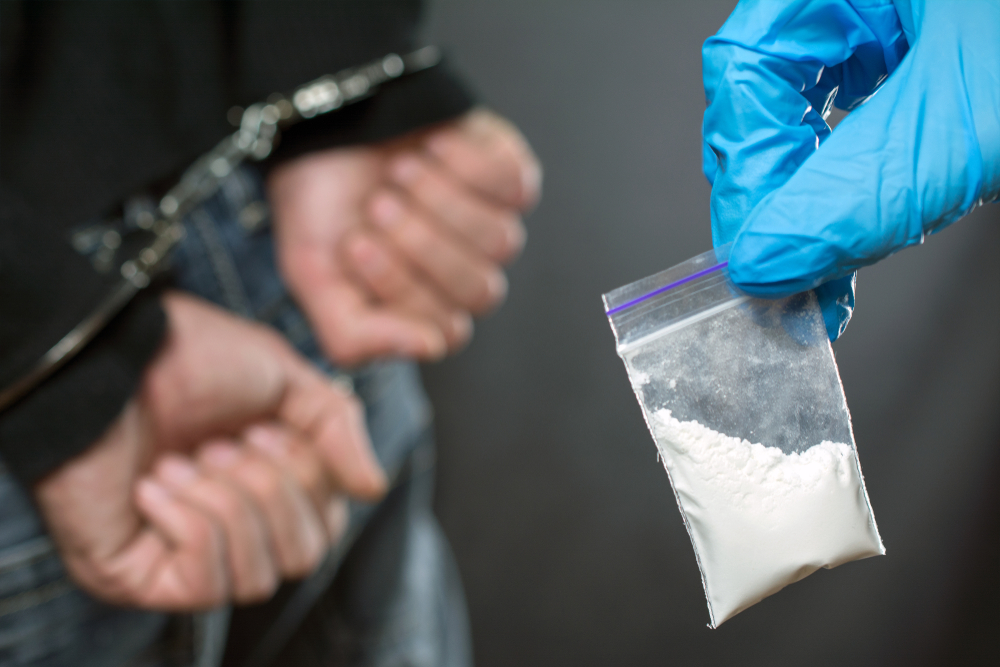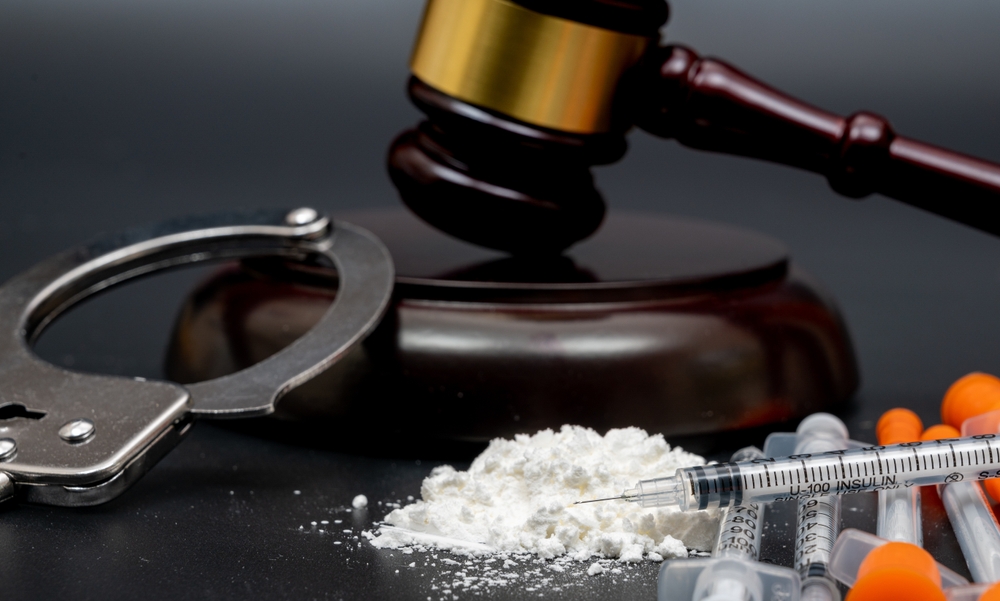A trafficking charge in South Carolina does not mean police believe you ran a drug operation or sold anything. Under state law, simple possession of a threshold weight—ten grams of cocaine, four grams of heroin, ten pounds of marijuana—automatically becomes trafficking, even if the drugs were for personal use. The moment you cross that weight line, you face mandatory prison time. Judges cannot suspend or probate those floors, and for many trafficking tiers classified as "no-parole offenses," you must serve at least 85 percent of the sentence before release.
At Fedalei & Reid Law LLC, we challenge how evidence was gathered, question weight measurements, and fight to protect your freedom at every stage. Call (864) 668-1661 for a free consultation.

Key Takeaways for South Carolina Drug Trafficking Laws
- Trafficking in South Carolina is defined by weight alone—you do not need to sell, transport across state lines, or intend to distribute; possessing ten grams of cocaine or four grams of heroin triggers automatic trafficking charges regardless of intent.
- Mandatory minimum sentences mean judges have no discretion to reduce your prison time below the statutory floor, and many trafficking tiers are classified as "no-parole offenses" under South Carolina law, requiring you to serve at least 85 percent of your sentence.
- Constructive possession and conspiracy theories allow prosecutors to charge you with trafficking even when drugs were found in someone else's car or a shared home, or were never in your physical control.
- Fourth Amendment violations, faulty weight measurements, and chain-of-custody gaps offer defense pathways that may suppress evidence or weaken the prosecution's case before trial.
What Drug Trafficking Means Under South Carolina Law
South Carolina's trafficking statutes focus entirely on weight, not conduct. Under SC Code § 44-53-370, possessing a certain amount of a controlled substance constitutes trafficking regardless of intent. The law treats possession of threshold quantities as trafficking automatically, stripping away any distinction between personal use and commercial distribution.
This weight-based approach catches many people off guard. You might have bought a larger quantity to avoid frequent purchases, shared a supply with friends, or stored drugs for someone else without realizing the legal consequences. The moment the scale tips past the statutory threshold, the charge escalates from simple possession or possession with intent to distribute (PWID) into trafficking territory, bringing mandatory minimums and serious custody consequences that change everything.
Prosecutors in Greenville and across the Upstate file trafficking charges regularly in cases that involve no evidence of dealing, no packaging materials, no scales for distribution, and no customer base. The weight alone drives the decision.
Drug Trafficking Thresholds By Substance
South Carolina law sets specific weight thresholds for each drug type, and crossing these lines triggers trafficking charges with tiered mandatory minimums. The amounts might surprise you—they are lower than many people expect, and the law measures the total mixture or compound weight, including any cutting agents mixed with the drug.
Understanding these thresholds helps you recognize when simple possession becomes something far more serious:
- Marijuana: Ten pounds or more triggers trafficking, with penalties increasing at 100 pounds, 2,000 pounds, and 10,000 pounds (see SC Code § 44-53-370(e))
- Cocaine and Methamphetamine: Ten grams or more under SC Code § 44-53-375, with escalating penalties at 28 grams, 100 grams, and 400 grams
- Heroin and Fentanyl: Four grams or more, with higher tiers at 14 grams and 28 grams (see SC Code § 44-53-370(e))
- MDMA (Ecstasy): Ten grams or more, with increases at 28 grams and 100 grams (see SC Code § 44-53-370(e))
- LSD: One hundred dosage units or more, measured by dose rather than pure weight (see SC Code § 44-53-370(e))
These thresholds apply to the total mixture weight seized, not the pure drug content. If officers find cocaine mixed with cutting agents, the entire compound counts toward the trafficking threshold. A small bag that feels inconsequential might weigh enough to trigger the ten-gram floor once the full mixture inside is measured.
Mandatory Minimum Sentences and No-Parole Offenses
Mandatory minimum sentences remove discretion from judges. When you are convicted of trafficking, the judge cannot suspend the sentence, grant probation, or reduce the prison term below the statutory floor, no matter how sympathetic your circumstances or how minimal your role.
South Carolina classifies trafficking as a violent crime under SC Code § 16-1-60, which carries serious custody and release consequences. Many trafficking tiers are also classified as "no-parole offenses" under SC Code § 24-13-100, meaning you must serve at least 85 percent of your sentence before release. Lower-tier marijuana trafficking may not fall into the no-parole category, but higher-tier offenses—particularly those involving cocaine, heroin, methamphetamine, and fentanyl—routinely trigger the 85 percent rule, meaning you must serve at least 85 percent before release.
For a first-time trafficking conviction involving ten grams of cocaine, the mandatory minimum is three years, meaning you must serve at least 30.6 months before walking free if the offense qualifies as a no-parole offense. If the amount reaches 400 grams or more, the 25-year mandatory minimum translates to more than 21 years of actual incarceration.
The "violent crime" label also creates collateral consequences that extend beyond prison time. A trafficking conviction disqualifies you from firearm ownership, makes you ineligible for certain jobs and professional licenses, and may affect your immigration status if you are not a U.S. citizen.
How You Can Be Charged With Trafficking
Trafficking charges do not require actual physical possession of drugs. South Carolina law recognizes multiple theories that allow prosecutors to charge you even when the drugs were not in your hands, your pockets, or your home.
Actual Possession
Officers find drugs on your person during a search, and the weight exceeds the trafficking threshold. The drugs are in your direct control, and the state has clear evidence linking you to the substance.
Constructive Possession
You may be charged with trafficking if drugs are found in a place you control—your car, your home, a storage unit you rent—even if you were not present when officers discovered them. The state must prove you knew the drugs were there and had the ability to control them, but prosecutors often argue that your connection to the location is enough to establish constructive possession. Shared spaces create particularly difficult situations. If drugs are found in a car you share with roommates or a home where multiple people live, everyone with access might face trafficking charges.
Conspiracy Charges
Under South Carolina law, you can be found guilty of trafficking if you agreed with someone else to possess, transport, or distribute a trafficking quantity, even if the plan was never completed or you never personally handled the substance. Prosecutors use conspiracy theories in cases involving intercepted communications, informant testimony, or surveillance showing coordination between multiple people.
Aiding and Abetting
If you drove someone to pick up a trafficking quantity, allowed your home to be used for storage, or provided money that was used to purchase drugs, you might face trafficking charges as an aider or abettor, with the same penalties as the principal offender.
Trafficking Versus Other Drug Charges
The line between trafficking and other drug offenses often comes down to weight, but prosecutors have discretion in how they charge cases, and their decisions carry enormous consequences for your freedom and your future.
Possession with intent to distribute (PWID) under SC Code § 44-53-370 is a serious felony that carries significant prison time, but it does not trigger mandatory minimums or the violent crime label. PWID charges allow judges to consider probation, suspended sentences, and alternative programs like drug court. First-offense PWID involving powder cocaine carries up to five years, while crack cocaine offenses under different provisions may bring harsher penalties, but judges retain full sentencing discretion in PWID cases.
Simple possession is a misdemeanor for small amounts of marijuana or a felony for other controlled substances, but penalties are far less severe than trafficking or PWID. Simple possession charges are appropriate when the amount is clearly for personal use and no evidence suggests distribution.
Prosecutors sometimes "charge up" by filing trafficking charges in borderline cases where the weight barely exceeds the threshold or evidence of distribution is weak. This strategy creates leverage in plea negotiations, pressuring defendants to accept plea deals to avoid mandatory minimums.
Defenses To Drug Trafficking Charges
Trafficking charges are not unbeatable. Fourth Amendment violations, evidentiary problems, and weaknesses in the state's case create defense opportunities that may suppress evidence, dismiss charges, or force prosecutors to negotiate reduced charges.
Common defense strategies we pursue in Greenville trafficking cases include:
- Illegal search and seizure challenges when officers violated your Fourth Amendment rights by stopping your vehicle without reasonable suspicion, searching without probable cause or a warrant, or exceeding the scope of lawful search authority
- Challenging weight measurements in cases near the trafficking threshold, demanding to see lab reports, questioning testing procedures, and hiring independent experts to retest when results seem inflated
- Lack of knowledge or control arguments that defeat constructive possession charges when drugs were hidden in shared spaces or you had no idea they were present
- Chain of custody problems that create reasonable doubt when evidence handling is sloppy or documentation showing who handled the substance at each step is incomplete
- Entrapment defenses when government agents induced you to commit a crime you were not predisposed to commit through pressure or manipulation
These defenses require immediate action. Evidence disappears, witnesses' memories fade, and officers' body camera footage gets overwritten on routine schedules. We start investigating the moment you hire us.
What To Do If You Are Charged With Trafficking
The hours and days immediately following a trafficking arrest determine how strong your defense becomes. Mistakes made early—talking to police, consenting to searches, waiting to hire an attorney—weaken your position and limit our options.
Steps to take immediately after a trafficking arrest:
- Invoke your right to remain silent and politely refuse to answer questions without an attorney present, no matter what officers promise about cooperation leading to leniency
- Do not consent to searches of your home, car, or phone; officers will search anyway if they have probable cause, and if they lack it, your consent hands them evidence they could not obtain lawfully
- Write down everything you remember about the arrest—where you were, what officers said, whether they showed you a warrant, who else was present
- Hire an attorney immediately so we can preserve evidence, file motions to suppress, and negotiate with prosecutors from a position of strength
- Follow all bond conditions if released, including curfews, travel restrictions, and drug testing requirements
You do not have to figure this out alone. We guide you through every step, explain your options in plain English, and move fast to protect your future.

FAQ for South Carolina Drug Trafficking Laws
Can I Get Probation for a First-Time Trafficking Charge in South Carolina?
No. Mandatory minimum sentences for trafficking convictions require prison time, and judges cannot suspend the sentence or grant probation. Even first-time offenders with no criminal history must serve the mandatory minimum, which starts at one year for marijuana and three years for cocaine or methamphetamine. The only way to avoid prison is to get the charge reduced to a non-trafficking offense through negotiation or to win dismissal or acquittal by challenging the evidence.
What Happens If Drugs Were Found in a Car I Was Riding In That Did Not Belong to Me?
You may still face trafficking charges under constructive possession or conspiracy theories, but the state must prove you knew the drugs were present and had the ability to control them. If drugs were hidden in someone else's bag, if the owner admits the drugs were theirs, or if you had limited access to the area where drugs were found, these facts weaken the state's case.
How Long Do I Have to Fight Trafficking Charges Before Trial?
South Carolina does not have a fixed speedy-trial clock like some jurisdictions. Courts apply a constitutional balancing test based on the Sixth Amendment, and pretrial motions—particularly motions to suppress evidence based on Fourth Amendment violations—can extend timelines. Getting counsel early helps you push the case forward or preserve delay-based defenses if the state drags out prosecution unreasonably.
Can Trafficking Charges Be Reduced to Possession With Intent to Distribute?
Yes, in some cases. Prosecutors may agree to reduce trafficking charges to PWID if evidence problems weaken their case, if the weight is barely over the threshold, if no distribution evidence exists, or if you provide cooperation in other investigations. PWID eliminates mandatory minimums and the violent crime label, giving judges discretion to impose probation or treatment programs.
What If Police Did Not Read Me My Miranda Rights During My Trafficking Arrest?
Miranda warnings are required before custodial interrogation, not before arrest. If officers arrested you without questioning, no Miranda violation occurred. If officers questioned you after arrest without reading Miranda warnings, statements you made may be suppressed, but physical evidence seized during the arrest typically remains admissible.
Schedule Your Free Consultation With FR Law Today
Drug trafficking charges in Greenville threaten your freedom, your record, and your future with mandatory prison time and lifelong consequences. At FR Law, we challenge illegal searches, fight to suppress evidence, and move quickly to protect your rights at every stage. You do not have to face this alone. Call (864) 668-1661 or contact us online to schedule a free consultation.
